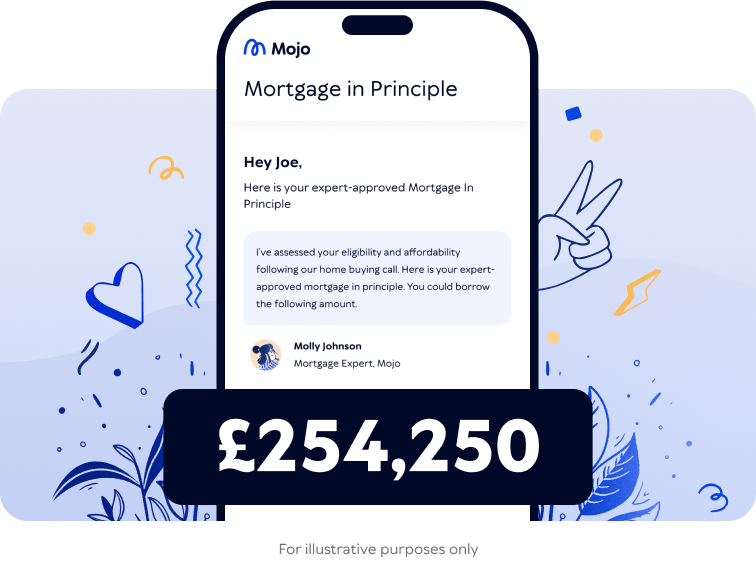What is a mortgage offer?
Most homeowners will remember receiving their mortgage offer. It tells you that your chosen lender is happy to provide the funds you need to buy your dream home. But it’s not a guarantee just yet.
In this guide, we’re diving into what a mortgage offer is and what you need to know once you get one.


Author - Helen Lovell Editor - Stuart Bowman
Last reviewed on 3 November 2025
Key things you need to know about a mortgage offer
What is it? A mortgage offer means your mortgage application has been approved, and that your lender will provide an exact sum of money in order for you to buy a specific property
When do I get it? After you have submitted your application. Your lender will carry out credit checks, affordability checks and a property valuation before issuing a mortgage offer
How long does it take? 78% of our home buying customers got a mortgage offer within four weeks of applying through us*
How long does it last? Your mortgage offer is usually valid for between three and six months. This should give you plenty of time to complete before it expires
Is a mortgage offer guaranteed? It’s a good indication that you’ll get the funding you need, but an offer can be withdrawn if your circumstances change significantly
What if rates change in the meantime? Don’t worry - your broker will be able to check mortgage rates before completion to see if a more suitable deal has become available
What is included in a mortgage offer?
There’ll be no shortage of paperwork to wade through when you buy a house, but we can’t stress enough how important it is to read your mortgage offer thoroughly and carefully.
That’s because your mortgage offer will outline the key terms of your mortgage including:
-
Loan amount: The total amount of money your lender is prepared to lend you
-
Property details: The address of the property the offer is for
-
Mortgage type: The type of mortgage you’ve applied for (such as fixed-rate or variable-rate)
-
Monthly payment amount: The amount of money you’ll repay each month
-
Interest rate: The cost of borrowing. Pay close attention to whether this is an initial rate, and what the standard variable rate will be after the initial deal period ends
-
Term length: How long you’ll be repaying the loan for
-
Repayment method: How you will repay the loan (for example, whether you’re paying both capital and interest or interest-only)
-
Fees and charges: A list of all fees associated with the mortgage, including product fees, valuation fees and early repayment charges
-
Mortgage rules: Information about overpaying your mortgage or what will happen if you don’t make your mortgage repayments
-
Conditions: Any specific requirements the borrower must meet for the mortgage to proceed

“Your mortgage offer is a legally binding document, so it’s important you understand what you’re signing up for. Ask your broker for help if you have any questions or you’re unsure of anything at all.”
April Aldridge, Director of Customer
How do I get a mortgage offer?
You’ll get a mortgage offer as part of the mortgage application process. This usually happens once you’ve already got your mortgage in principle, found a property and put an offer in, submitted a full mortgage application and arranged for your lender to carry out a property valuation.
Getting a mortgage offer is probably more exciting for first-time buyers and home movers. But those remortgaging will also need a mortgage offer from their new lender outlining the terms of the new mortgage deal. This is usually issued after you’ve submitted a mortgage application, and confirms the lender’s happy to go ahead.

The difference between a mortgage in principle and a mortgage offer
A mortgage in principle (MIP) gives you an idea of how much a lender might allow you to borrow, whereas a formal mortgage offer confirms they’re willing to provide a specific loan amount for a particular property.
So, if you’re just starting your house search, you’ll need to get a MIP first. We can help with that.
How long does it take to get a mortgage offer?
It typically takes around two to four weeks after submitting your full mortgage application to receive a formal mortgage offer.
Timelines can vary depending on your lender’s processing times, how quickly you can arrange a property valuation and the complexity of your individual case.
In our experience, it’s common for home buyers to get a mortgage offer even quicker. 9% of our homebuying customers got their offer within a week of submitting an application*!
“Our first discussion took place on a Wednesday and our mortgage offer was received the following Wednesday, despite there being a bank holiday Monday and the offer of the house being accepted on the Friday. Amazing!” Read Rob’s full review
Rob
09 May 2025
How long does a mortgage offer last?
A mortgage offer usually lasts for three to six months, although this can vary between lenders. Some offers specify the date you must complete by. Others will expire a specific duration after the offer is made or a set time after the initial application.
Either way, your expiry date will be clearly stated in your mortgage offer document. So pop the date in your calendar and make sure you don’t forget it!
What should I do if my mortgage offer expires?
A mortgage offer might expire if there are delays in the conveyancing process or you’re buying a new build properly that won’t be completed in time.
If your offer is likely to expire, contact your lender straightaway. Some lenders offer the option to extend your mortgage offer, usually by an additional month but in some cases up to six. This is most typical for those buying a new build property. It’s best to get in touch with your lender as far in advance of your expiry date as possible, as they may require a couple of weeks’ notice to extend your offer.
If an extension isn't possible or you've missed the expiry date, you'll probably need to reapply for a new mortgage. Keep in mind that this will involve a new application, including new credit and affordability checks. As a result, you may be offered different terms or interest rates. You'll likely need to pay fees again, too, including the cost of a new property valuation.
While going through the whole mortgage application process again isn’t ideal, on the plus side, it does give you an opportunity to compare mortgage deals again. You could even find that the products available to you are more favourable than your original deal, but they also could have increased.

How a broker can help you secure a mortgage offer
Our brokers will…
Compare lenders and recommend the most suitable match for you
Help you prepare your application, checking there are no mistakes or inaccuracies which could delay the process
Suggest ways to strengthen your application to boost your chances of acceptance
Track your application and liaise with your lender, solicitor and estate agent to avoid unnecessary delays
Check current market rates to ensure you’re on the most competitive deal
Continue to support you from mortgage offer to completion
What happens after a mortgage offer is issued
Once you’ve received your mortgage offer and you’re happy with the terms, you’ll formally accept the offer. This usually involves signing and returning a copy of the offer document to the lender, which can often be done online nowadays. Your solicitor or conveyancer can then continue with the legal aspects of the property purchase.
Your mortgage offer can still change or be withdrawn right up until the point of completion, so it’s important to keep your solicitor and broker informed if there are any changes to your circumstances in the meantime.
And remember - it’s not too late to change rates after you’ve received your offer! Often, you can switch rates up to a few weeks before completion. So, if rates fall after you’ve already locked in a deal, we can still help you change to your lender’s better rate. Here’s a step-by-step guide to the full mortgage application process.
Can anything go wrong after getting a mortgage offer?
While it’s certainly uncommon for a lender to withdraw an offer before completion, it can happen. This is usually for the following reasons:
-
There’s been a significant change in your financial circumstances (for example, you’ve lost your job or taken on substantial debt)
-
There's an issue with the property, such as the property drops in value or problems are identified during surveys
-
Issues are identified during legal checks
-
The lender finds out you’ve provided incorrect or inaccurate details in your initial application (even unintentionally)
-
The mortgage offer expires

“As long as your circumstances are the same as they were when you first received your mortgage offer, there really shouldn’t be anything to worry about. But if there are any changes to your employment, financial situation or the purchase price of the property, you legally need to tell your lender as soon as possible rather than burying your head in the sand. Your broker can help guide you through the process - the extra support and reassurance can be a big help if you’re going through a stressful time.”
John Fraser-Tucker, Head of Mortgages
5 tips to help you improve your chances of getting a mortgage offer
- 1.
Check your credit score. Review your credit report in advance and address any errors or inaccuracies before applying
- 2.
Get a mortgage in principle (MIP). Obtaining a MIP early in the process can give you an idea of how much you can borrow, so you won’t encounter unexpected surprises later down the line
- 3.
Choose the right lender. Not all lenders are equal - compare rates, terms and eligibility criteria across different mortgage providers to make sure you’re applying with the most suitable one
- 4.
Submit an accurate application. Be honest and thorough when preparing your mortgage application - small, unintentional mistakes can set you back
- 5.
Work with a broker. They’ll help to prepare and submit your mortgage application, offering tips and expert advice on ways to improve your chances of getting a mortgage
FAQs
No, you don’t. If you’re not happy with the terms presented in the offer, you’ll be able to look at mortgage options either with the same lender or a different one.
While accepting the mortgage offer signifies your intention to proceed with that lender, you’re not legally forced to take it.
If you’re buying a property, you only become legally committed to the property purchase when you exchange contracts. If the house sale falls through, your mortgage offer will usually become void. You’ll then have to go through the mortgage application process again once you’ve found a different property.
You also have the option to change your mind and apply for a mortgage with a different lender after accepting the offer.
There are some downsides to this, though. You may have already paid some fees, such as valuation fees, that may be non-refundable depending on the lender and the terms of your mortgage offer. Switching mortgage offers can also potentially delay your house purchase, too, as you’ll need to go through the whole application process again.
A revised mortgage offer is a new or updated version of your initial offer, which you’ll usually only get if something has changed since your original offer was issued.
A mortgage offer can change because your valuation comes back lower than the purchase price you agreed to. Your lender may reduce the amount they’re willing to lend or may offer a higher interest rate if you need to borrow a higher percentage of the property price.
If this happens, you can have a few options:
Increase the loan-to-value, which means you’ll be borrowing more at potentially higher interest rates
Try to renegotiate the purchase price with the seller based on the lower valuation
Increase your deposit to bridge the gap between the property valuation and the price you agreed (though be mindful that this could increase your chances of falling into negative equity)
Appeal the valuation with the lender
Consider applying for a mortgage with a different lender, in the hopes they might provide a higher valuation
As a very last resort, you may have to withdraw from the purchase if your lender won’t agree to fund the required amount and you can’t bridge the financial gap. It’s worth speaking with a mortgage broker for guidance.
*All data shown is from Mojo Mortgages' own customer records, covering the period from 1 January 2025 to 31 October 2025